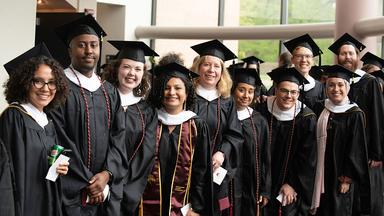Called “the world’s leading authority on occupational licensing,” Humphrey School Professor Morris Kleiner was honored for his lifelong research and expertise on the subject by the Labor and Employment Relations Association (LERA).
Kleiner, AFL-CIO Chair in Labor Policy, is a 2018 recipient of the organization’s Lifetime Achievement Award, in recognition of his accomplishments in the field of industrial relations and human resources. LERA is the largest and most prestigious organization focusing on research and policy in the field.
Kleiner received the award last month at LERA’s annual conference, with the organization’s president Harry Katz, a chair professor at Cornell University, praising Kleiner’s distinguished work over the past 40 years.
“He has put his research and analytic skills to use in the public policy domain, frequently serving as an expert witness and consultant to a host of government agencies and organizations,” including both houses of Congress, the Office of the President, the Federal Trade Commission, and the National Science Foundation.
“I'm very honored to receive this award, especially given the stature of previous recipients,” says Kleiner, noting that former US Cabinet secretaries, leaders of international labor unions, university presidents, and other prominent individuals have been recognized in the past.
“I am most thankful and grateful for the environment at the Humphrey School and the University of Minnesota that has allowed me to achieve this honor,” says Kleiner.
Much of Kleiner’s work focuses on the practice of federal, state, and local governments requiring licensing for a growing number of occupations. Some examples include hair braiders, mechanics, locksmiths, and interior designers. He found those licensing requirements can have “significant social costs,” with workers being kept out of professions, and consumers overpaying for services.
His latest research project, conducted with Humphrey School colleague Janna Johnson, looks specifically at how occupational licensing can make it harder for workers to move to states that have more jobs available.


